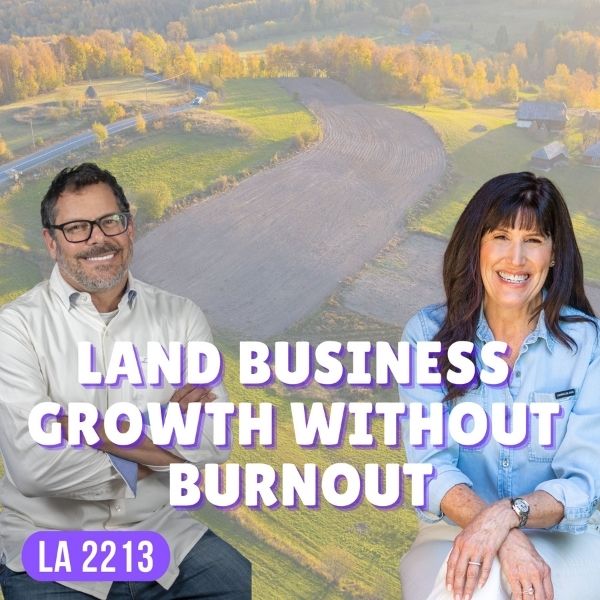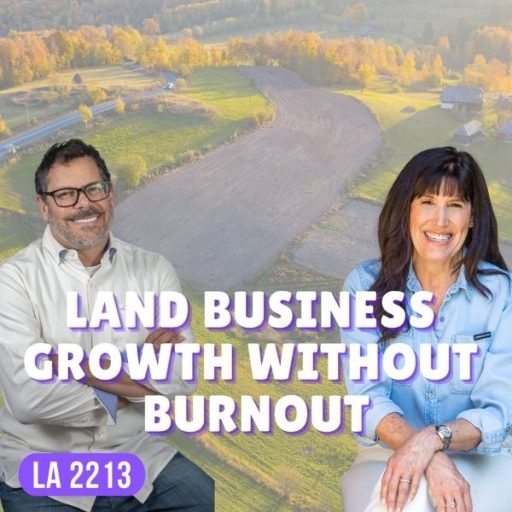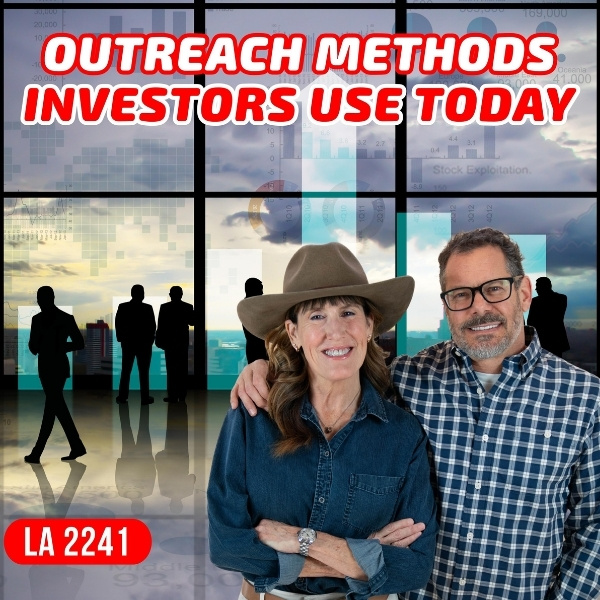Recognizing & Addressing Burnout Early
This is episode number 2213. In this episode, Jill and I are talking about scaling your land business without burning out. I have to tell you, on a personal note, I have been burned out probably two, three, or maybe four times in my life pretty seriously. You tell me, but it comes with this personality type that we have. I don’t know if you’ve ever been seriously burned out to the point where you’re like, “I don’t care how much money it makes. I’m tired of it.”
I did with parenting and cooking.
We’ll talk about that. I did that with parenting, too. I’m still a burned-out parent.
There’s not a lot of home cooking that goes on in our house. I am burned out on that. I did a lot of meals. How many years’ worth of meals with the youngest? I don’t know.
I don’t get burned out on cooking. I get burned out on people’s responses that I’m cooking for.
I get burned out on the shopping for the cooking. Do you know what it is? It’s the pick in the menu and the shopping for it. If only everything were done there for me. Everybody’s going to go, “That’s a service you can get.” I’m like, “I know. I could do that.”
I’ve learned this. It’s not possible to effectively cook for a very picky eater. They don’t like it. If they don’t like it and they’ve got to get the salt shaker out and the whole thing, it’s not worth the effort of cooking.
That might be a pet peeve of yours. Am I hearing that correctly?
We’re talking about burnout in this episode. Each day on the show, we answer a question from our Land Academy Member Discord Forum and take a deep dive into land-related topics by popular requests.
Qualifying Sellers & Setting Up Answering Systems
Tara wrote, “For those of you who use PATLive or something similar like an answering service, do you have the receptionist ask the caller if they accept the offer on the letter, and if not, what is their asking price? I saw that as an option on the pre-written script. On one hand, I’d love to have that info before getting on the phone with them. On the other hand, I don’t know if I want that to be handled by the receptionist on the first call. We’d love to know what you guys think. Thanks.” I do. I wrote that.
This is all you.
I wrote that on purpose. I want to know, “Does this price work for you? If not, what does work for you?” They’re like, “It doesn’t work for me. I do want to sell, but not at that price.” I’m like, “Do you have one in mind? If not, let me move this forward so the owner’s going to call you back.”
How you implement this is up to you. We can only tell you how we do it because it works. This whole mailer is designed to work itself out. You do a 10,000-unit mailer. You’re going to reach 10,000 people, and you’re going to get a 1% response. Let me put it that way. You’re going to have between a 1% and 2% response, depending on how you implement the mailer.
Between 100 and 200 people are going to respond. Half of those are going to say, “There’s no way.” On a 10,000-unit mailer, you’re going to work with about 50 people who probably want to sell their property. What matters is the person who’s answering the phone, whoever they are, separates the people who want to or don’t want to sell their property, however you see that happening. I don’t know how you guys do it. How do you utilize PATLive? Do you answer the phone yourself? Does Jan do it? What happens?
Both. Sometimes, it’s me. Sometimes, it’s staff. Sometimes, it’s PATLive, depending on how busy it is, their workload, and the call volume. Whoever it is, that’s one of the first questions. It’s almost question number two. Question number one is, “What’s going on? Why do you want to sell?” Let’s first make sure they are a serious seller.
If they’re like, “I don’t, but this number intrigued me,” this could go either way. Maybe they’re like, “I need the dough. My engine died. I can’t get to work.” It’s like, “Now I got that out of the way, does this number work for you? Let’s see how fast we can do this.” It’s a lot of that spoken very nicely, not machine-like. Remember, you’re trying to win them over, too, at the same time. Tara, keep it in there. There’s no reason not to.
This is going to change. It already is changing.
What’s going to change?
Customer service and how people talk on the phone. It’s because of AI. I’ve tested 2 or 3 AI scenarios, not necessarily about land, but talking to them, and I can’t tell the difference.
It’s hard.
I cannot tell the difference between the fact that it’s a computer or a real person. What’s going to happen? This is my prediction. It will lead to no one talking on the phone anymore because you don’t know who’s real. You don’t know if you can get any real information. That’s part of the epidemic that we have with people’s cynical attitudes. Nobody knows what’s real.
Since we’re on this topic, I hope that every AI response or whatever it is, if I ask the question, “Are you real or not?” they should legally be required to say whether they’re real or not, because I’m going to look at things differently. If I’m scheduling a doctor’s appointment or a dentist appointment, I don’t care if it’s AI or not, but if you’re reading me my test results, I want to know. I don’t want that. I want the doctor. I want the trained tech talking to me about my test results.
Scaling Smart: Replacing Yourself & Automating
No matter who you are, what business you’re in, or what you do with your life, our lives are going to change dramatically in the next 36 months because of all this. How you go through a regular day is going to change. Some of it’s going to be good, and some of it’s going to be bad. We don’t know what yet. Our topic is scaling your land business without burning out.
This is a real thing. We talked about drive and things that cause people to fail. You were like, “I hear you. I have to surround myself with the right people. I’ve got to come at this committed. I have to put everything into it.” Somebody is like, “Jack and Jill, I can’t do this for five years straight. I will burn out.” I get it. That’s real. You’re right. What do you do to make sure you don’t burn out and your business doesn’t fail because of that? A couple of things. One, you have to know your weaknesses.
That was what I was going to say. Know yourself. Don’t do stuff you don’t want to do forever.
There are a lot of people that I deal with on this when I’m doing individual coaching. They’re like, “I hate answering the phone.” I’m like, “I know, Tara. I know it sucks, but you don’t have anybody else right now.” It was Tara who asked this question. I was like, “Tara, if you can’t do this, then you need to do this. Somebody’s got to answer these calls. It can’t go to voicemail if you want to do deals.” She was like, “I got it. I can do it for a little while while I train, hire, or whatever.” I said, “That’s it.” You’ve got to know your weaknesses.
That leads into number two, which is that you are preparing to replace yourself. Automate when you can. I don’t mean to throw you under the bus here, Tara. Tara’s a sweetheart. Tara’s like, “I know what I’m great at, but I can do it, and I can do it well.” She has been doing well. She has moved over to PATLive, which is great. That’s automating it, too, for yourself.
There are other things that you can do in your business that you can truly automate, like parts of due diligence. You could have VAs or AI doing things. I am sure there are environments where you can set up AI to look up properties and check a box, whether it’s waterfront or not, or whether there’s legal access or not. All of that’s in place. Maybe we’re not that great at learning how to use it yet, but you can get yourself there.
Reader, check out PropStream. There’s a free seven-day trial. It’s shocking, but some of that stuff’s already here.
Know your weaknesses, prepare to replace yourself, and automate stuff. This is about burning out. You’re trying to grow your business. We’re not saying maintain because there’s maintaining without burning out, and then there’s scaling without burning out. You’re like, “I need to grow this thing.” That’s why you have to replace yourself, put yourself in the driver’s seat and the owner’s seat, and only do what the owner should be doing. Control your money and grow. For my last little burnout thing, there’s a component of this for everyone. I don’t care if you’re male or female. You need to give yourself a reward, whatever it is to you. What would be a reward for you?
Not working on Friday.
There you go. That’s a Jack one. I know people who are like me. I treat myself to a spa day. I do this. I do that. It’s not like I’m buying that ‘63 Stingray. Maybe that is a reward.
It’s not.
I’m saying this for some people. I’m not assuming you. For some people, they have a big reward like that. Paying off my house is a reward. It’s not just a necessity. It’s like, “I can breathe. How’s my life going to change for the better?” Having a goal slash reward to keep you motivated helps me. What are the things you also think?
It starts with this, and I’ve been saying this for a lot of years. You are working on stuff that you do not want to work on, and you have no real interest in it. Let’s say you’re a researcher in a lab in a hospital and you don’t like that. There’s only so long that you’re going to be able to take it, and it’s going to start to affect other parts of your life.
What I would say, and this is my response to this after being burned out a few times, not on land, but on other things in life, is to map everything out. Have a budget. It’s not so much a financial budget, but time. What’s going to happen in the next twenty years of your life?” Me talking to myself, I’d be like, “This year, I’m going to do this. I’d like to be at this finance milestone. I’d like to be in a certain city with Jill doing this.” As silly as it sounds, it is a vision board, but in Excel for me.
You’re like, “I’m not going to do this for the rest of my life. I’d like to get rid of answering the phone by next June.” You have some framework so that when you’re answering the phone, you’re saying to yourself, “I only have to do this until June,” because that’s the whole thing. You’re like, “I only need to do two more deals. I have enough money to hire somebody to do it.” Make a framework for yourself.
I had a light bulb moment. It didn’t even dawn on me. Are you saying your vision board is an Excel spreadsheet?
Yes. Is that good?
I have seen it. I know exactly what it looks like. I’m not one to assume, but you’re saying that’s your version of your vision board. I love it. Mine doesn’t look like that.
I know. What does it look like? Does it look like you’re fourteen and you take stuff out of magazines and paste it up there? There’s a man with no beard.
No. My vision board is where your dream catcher is.
Your vision board is right in your soul?
It is in my soul. My vision board changes often. That’s probably why. It’s like, “This is my new vision board.” My new vision board involves a lot of water.
Ocean water. We can get back to Jill’s dream catcher in a minute. What you don’t want to happen is this. At the end of my public accounting career, I became a partner at KPMG. This is the sentence that I said to myself before I put my notice in. I said, “I will flip burgers for the rest of my life. I don’t care. I’m not working here for more than two more weeks.” That is a true burnout situation.
You were about to snap. Is that right?
I look back on that. I could have avoided that years before by listening to myself and being honest about, “I can’t do this forever. I have to put together my exit strategy now or plan to become a partner.” I was a terrible accountant. I was good at getting new clients. I became a partner quickly, and it was only because I was good at, believe it or not, speaking with people and presenting in a boardroom.
In the end, companies would hire the company I worked for to have me do board presentations for their board because the CEOs didn’t want to do it. For whatever reason, at that time, I could present. All it is is making people laugh. I’m not tooting my own horn. I’m saying all that success, reward, and all of it, I couldn’t take it. I couldn’t take the politics and the people that I was working with. Don’t let that happen to you. Don’t let it happen to you specifically in your land business.
There are probably eight components to this whole business. I bet you love three of them and you don’t like the other ones, I’m guessing. Lucky for Jill and me, the stuff she likes to do, I can’t stand it, and vice versa. It makes for very effective partners together. That was my answer. Was this the eBay episode, or was it the one before this?
The one before.
The last time I thought the whole business model was completely over, it wasn’t over at all. It was that I didn’t want to do the stuff that needed to be done. Namely, talk on the phone and get things back on track with buyers and sellers.
Thank you.
I hope that makes sense.
It’s perfect.
Join us in the next episode where Jill and I discuss understanding landmark cycles and acting accordingly. You are not alone in your real estate ambition. We are Jack and Jill, information and inspiration to buy undervalued property.















